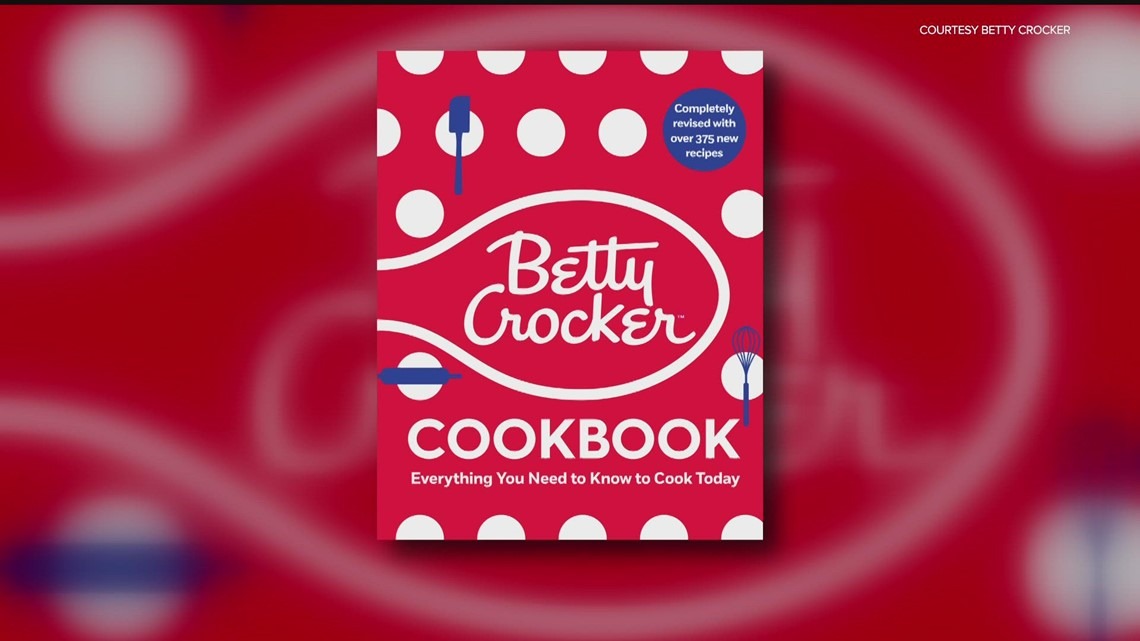I crack open the bright red, polka dotted cover of the 13th edition of the Betty Crocker Cookbook: Everything You Need to Know to Cook Today with a sneer, expecting mundane and homogenized recipes. But then I land on Yum Yum Sauce, a condiment I love but did not realize I could make at home. I jot down the recipe title on a page of scratch paper. I keep browsing the 704-page book, which was published this past October. I fill the entire page and, within a half hour, I plan a week’s worth of meals for my family, plus an aspirational brunch menu: Sheet-Pan Hash Browns, Overnight Everything Bagel Breakfast Casserole, and Lemon Curd-Filled Brunch Cake.
I find this infuriating. Now I have to admit that I actually love Betty Crocker, which is so banal it’s like saying, unironically, that I love watching Pentatonix holiday music videos. It’s unoriginal, but true. Betty Crocker never lets me down. She’s been my beloved dinner muse for most of my adult life, in the form of the 8th edition of the Betty Crocker Cookbook, which I’ve used so frequently that the food splattered pages have ripped away from the broken spiral binding. I need a new recipe collection, but liking the contemporary version of the Betty Crocker Cookbook feels like submitting to the corporate overlords that created Betty and homemaker culture in order to sell a bunch of boxed dessert mixes. But maybe that’s not so bad. After all, has a Betty Crocker brownie mix ever disappointed anyone?
The original Betty Crocker Picture Cookbook, published in 1950, had a clear and paternalistic purpose: to instruct housewives in the proper way to stock their pantries, serve nutritionally balanced meals, and adhere to food safety guidelines. Betty Crocker molded post-war homemakers in her own image, much like the Picture Cookbook salad recipes molded canned fruit and mayonnaise in whimsically shaped gelatin suspensions.
Today’s incarnation of Betty Crocker is less overtly instructional. She comes across like a real person, a faceless influencer who jauntily swooshes a cross through the double Ts in her first name. But Betty Crocker isn’t an individual. She’s an institution, a groupthink project ginned up by a flour company that would eventually become the multinational food conglomerate General Mills. She’s been signing her name that way for over 100 years. Betty Crocker is not like real, live food celebrities, the Alison Romans and Ree Drummonds who take a perfunctory, axillary temperature of what Americans crave before offering their own specific visions of what to cook. Betty Crocker thrusts the spiky end of her metaphorical digital kitchen thermometer into the thickest, densest meat of the American palate and she tells us how high the digits should go. Betty Crocker created the American home kitchen. We’re just cooking in it.
The book opens with a salutatory letter addressing “Makers,” a meaningless term derived from homemaker, I assume, in order to avoid gendering those who do not earn an income, or alienating wage earners who also cook. “Anyone can be a Betty,” the introduction declares, and touts the 1,300 recipes, among which “there’s something for everyone and every occasion.” Indeed, the 20 individuals and entities listed as contributors on the book’s copyright page have market researched, test kitchen-ed, and sans serif font-ed an incredible and comprehensive text that triples as recipe collection, reference work, and instruction manual.
The lovely layout features styled photographs of most dishes and helpful, related insets, like step-by-step pictures showing how to roll up and cut collard greens or how to use dental floss to slice dough for Caramel Sticky Rolls. In a nod to social media aesthetics, five-Ingredient recipes appear throughout the book. The titular ingredients are photographed together and labeled with handwriting font and arrows pointing to each item, to help Makers differentiate between, for example, garlic and tomatoes when making Balsamic Chicken. These recipes feel gimmicky, like Betty Crocker is just showing off that she can play Pinterest, too.
One unlabeled photo on the main contents page looks so delectable that I spend an inordinate amount of time tracking it down in the index. This task is difficult because my Minnesotan eyes classify a 9x13 pan filled with a meat and creamed soup mixture, topped with tater tots and bacon bits, melted cheddar cheese, and an artful sprinkle of chopped green onions, as tater tot hotdish. But the recipe goes by the unbranded and regionally unspecific title Bacon Cheeseburger Potato Nugget Bake, and the index doesn’t include headings for Casserole, Hotdish, or Tater Tots. I finally find the recipe under three index entries, Potatoes, Bacon, and Beef (ground), which are accurate but not exactly intuitive.
After I make my meal plan, I check in to see if any dogeared recipes from my mutilated 1996 edition have been updated. I feel like this is a safe space to reveal that I am squeamish when it comes to protein, no matter how often I Google “Is that meat bleeding?” and the internet responds “Nope, it’s myoglobin.” I default to recipes that require very little handling of raw, dead flesh, like Chili Con Carne. The 13th edition aptly renames this dish Family-Favorite Chili and adds to it a second pound of ground beef, a can of tomato sauce, and, instead of an onerous combination of chili powder, oregano, cocoa, and red pepper sauce, a streamlined two tablespoons of chili powder. Classic, time-saving updates from Betty. She also offers many variations on a theme for Makers who tire of fixing the same dinners night after everloving night, like the smoked sausage and turkey alternatives listed below the main recipe, and the four additional chili recipes found elsewhere in the book: Black Bean Chili with Cilantro, Pulled Pork Chili, Sweet Potato Chili, and White Chicken Chili.
Recipe reinvention is turned into a cute format with an Heirloom recipe on one page, like Hummus, juxtaposed with a New Twist, a recipe with surprising ingredients, on the opposite page, like Roasted Sweet Potato Miso Hummus. Betty does this for another one of my 8th edition ground meat wheelhouse stalwarts, Italian Sausage Lasagna. Curiously, the New Twist, Jalapeno Tuna and Zucchini Lasagna, is labeled vegetarian. Things get a little wobbly here. I’m such a sucker for Betty Crocker’s authoritative and friendly tone that I have a newlywed, circa 2003 Jessica Simpson moment. Is tuna an animal, vegetable, or mineral? Betty doesn’t take a hardline stance on dietary exclusions when she broadly defines vegetarianism in the Getting Started section. But none of the recipes listed in the Fish & Shellfish chapter that call for short cans of tightly packed seafood chunks are labeled vegetarian, so it’s possible that the Chicken of the Sea question simply tripped up the AI indexer bot that assigned categorical tags.
The tuna confusion proves fortuitous, as it leads me to a glorious mashup called Tuna Pot Pie Stuffed Peppers, pairs of orange bell pepper halves brimming with a mixture of tuna and condensed cream of chicken soup, on top of which triangles of puff pastry balance like little insouciant top hats. The ingredient list anticipates any questions before they even occur to the Maker, noting that any color of bell pepper will do. The step-by-step instructions are a masterclass in language precision. This is quintessential Betty. American Modernist Betty. Is it pot pie? Or is it stuffed pepper? It is neither. Poundian Betty makes it new, with an economy of language that rivals Hemingway.
When I cook an unscientific sampling of new Betty Crocker Cookbook recipes, I ask my children to evaluate the Corn Bread, Apple-Cinnamon Muffins, Meatballs, and Hasselback Potatoes. They show me sideways thumbs, a gesture that means a meal is OK. Not great, but edible. A couple of recipes garner thumbs down, but those are my fault, not Betty’s. The Yum Yum Sauce tastes too tangy because I substitute apple cider vinegar for unseasoned rice vinegar, and stale because I use an old cellophane packet of smoked paprika that has gaped open in the back of my spice cabinet since at least 2018. Lemon Bars disappoint, not in flavor, but because my 13-year-old assistant cuts his hand on the janky old plastic cheese grater I hand him to zest a lemon. These errors in execution are preventable by following Betty’s “when in doubt throw it out” advice instead of resurrecting an ancient spice, or using proper equipment like the hand-held plane grater, paring knife, or zester listed in the Grating Lemon Zest and Juicing Lemons instructions.
The cookbook is a little cumbersome, but that’s a fair trade-off for a collection that promises to appeal to everybody and every occasion. I’m willing to accept the corporatized authorship and unwieldy breadth in order to enjoy a one-stop cookbook with recipes written by shrewdly technical wordsmiths and tested by experts. In theory, I want to spend hours reading food blogs that place twee, rambling stories ahead of specialty ingredient lists and byzantine instructions. But that’s not practical. I’m a time-crunched Maker, and just an adequate, meat-scared home cook. I need Betty Crocker’s guidance to prepare a fail-safe and veggie-forward dinner in under 45 minutes, for five people with wildly divergent taste preferences, with ingredients I can buy at Cub Foods. Her new cookbook, with its exhaustive tips and inventive variations, delivers just that.






